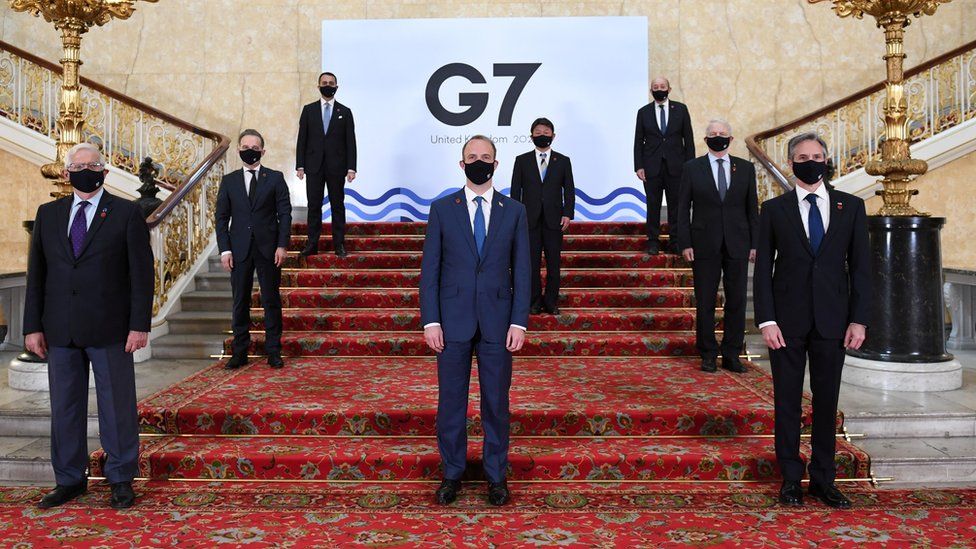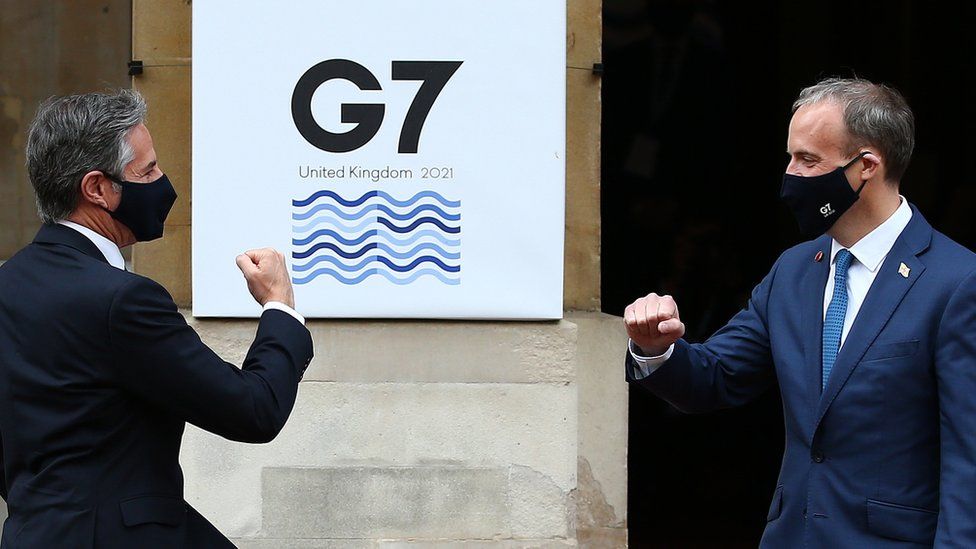Foreign ministers hold their first face-to-face talks for two years, amid tight Covid restrictions.

image copyrightReuters
The G7 are discussing global challenges including climate change and threats to human rights.
Foreign ministers from the world’s leading economies have met in London for their first face-to-face talks in more than two years.
UK Foreign Secretary Dominic Raab will lead discussions on the crisis in Myanmar, as well as relations with Russia, China and Iran.
The talks, held amid tight Covid restrictions, will finish on Wednesday.
The G7 group – the world’s seven largest so-called advanced economies – is made up of the UK, Canada, France, Germany, Italy, Japan and the United States.
Australia, India, South Korea and South Africa have also been invited as guests to the summit, as the UK tries to deepen ties with the Indo-Pacific region.
The UK, which currently holds the rotating presidency of the G7, will host a summit of leaders in Cornwall next month.
Regular testing at a special on-site facility, limits on the size of meetings and other measures have been used to prevent the spread of Covid-19 during the discussions.
Mr Raab, wearing a face mask, welcomed counterparts earlier at Lancaster House in London, with forearm bumps replacing the usual handshakes.
After talks on Myanmar on Tuesday morning, the G7 will discuss issues including the crisis in Libya and the war in Syria during the afternoon.
Mr Raab is expected to urge stronger co-operation between the G7 and the guest nations at a working dinner on Tuesday evening.
On Monday, Mr Raab met US Secretary of State Antony Blinken, who is making his first visit to London since being appointed by US President Joe Biden.
At a joint UK-US press conference following the talks, the UK foreign secretary said there was a shift towards “likeminded countries” working more closely together in the face of hostile states like Russia and China.
He said London and Washington stood “shoulder to shoulder” on issues such as these, while Mr Blinken said the US had “no closer ally, no closer partner” than the UK.
The summit comes amid criticism over the UK’s decision to cut overseas aid spending from 0.7% of national income to 0.5% – a reduction of more than £4bn.
Asked about the aid cuts, Mr Raab said it had been a “difficult decision” but that the UK still had scope “to be an even greater force for good in the world”.


Lancaster House in central London has played host to many historic negotiations, but rarely will it have seen such diplomatic speed dating as it will later.
For the next few days, foreign ministers will scurry round the clock from meeting to meeting, doing as much business face to face as they can after months of virtual diplomacy.
They will discuss the world’s big geopolitical issues: from China to Myanmar, Ethiopia to Ukraine, Syria to the Sahel.
The underlying theme will be how they can best organise to defend international rules and open societies against the threat of autocratic regimes.
And for the UK, the meeting’s host, it’s a big test to see if its global foreign policy can live up to its name.

Mr Raab said: “The UK’s presidency of the G7 is an opportunity to bring together open, democratic societies and demonstrate unity at a time when it is much needed to tackle shared challenges and rising threats.

image copyrightEPA
“The addition of our friends from Australia, India, the Republic of Korea and South Africa, as well as the chair of Asean reflects the growing significance of the Indo Pacific region for the G7.”
On Monday, it was announced that the G7 would use the summit to commit to investing $15bn (£10.8bn) to help women in developing countries.
They are also expected to agree a new target of sending 40 million more girls from low and middle income countries to school within five years.

